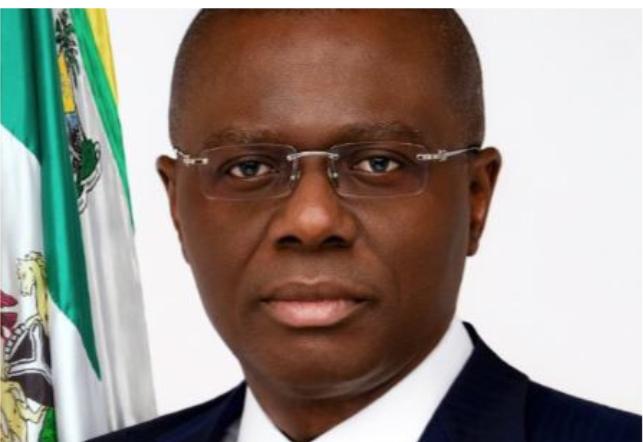Entertainment/Arts/Culture
Sanwo-Olu Calls for Global Standards in Regulatlng Creative Digital Contents

The Lagos State Governor, Mr Babajide Sanwo-Olu, says there should be global standards to regulate digital contents in the country.
Sanwo-Olu stated this as a guest at the ongoing Third Nigeria Digital Content Regulation Conference (NDCRC) organised by the National Film and Video Censors Board (NFVCB), in Lagos.
The governor, who was represented by Mrs Oloruntoyin Atekoja, Permanent Secretary, Ministry of Tourism, Arts and Culture.
said that Lagos State had become a hub for creativity, talent, and innovation, attracting filmmakers from all corners of the globe.“The vibrant Nigerian film industry, also known as Nollywood, has not only captivated local audiences but has also gained international recognition, solidifying its position as the second-largest film industry in the world.
“The growth of the film industry in Lagos State has not only brought immense cultural and entertainment value but has also contributed significantly to our economy.
“It has created numerous job opportunities, both directly and indirectly, for actors, producers, directors, technicians, and many others involved in the filmmaking process.
“Furthermore, it has boosted tourism, as visitors from far and wide are drawn to our state to experience the magic and diversity portrayed on the big screen.
“However, as we revel in our achievements, we must also address a pressing concern – the need for global standards to regulate digital content.
“In this age of digitalisation, where content can be easily accessed and shared across borders, it is crucial that we establish guidelines that ensure the quality, safety, and ethical standards of digital media,” Sanwo-Olu said.
The governor noted that the absence of global standards posed several challenges, adding that it had become challenging to protect the intellectual property rights of the nation’s filmmakers.
According to him, without proper regulations, practitioners’ work can be infringed upon, leading to financial losses and discouragement of creative talents.
“Additionally, the absence of standards may result in the proliferation of pirated and low-quality content, which not only harms the reputation of our industry but also affects the revenue streams of our filmmakers.
“Furthermore, the lack of global standards for regulating digital content raises concerns about the impact on our cultural values and societal norms.
“As content travels across borders, it is essential to ensure that it respects the diversity and sensitivities of different cultures.
“The absence of guidelines can potentially lead to the spread of content that may be offensive, inappropriate, or harmful to certain communities,” he said.
According to him, to address these concerns, it has become imperative for all stakeholders to work together, not only at the state or national level but also on an international scale.
“We should collaborate with fellow nations, industry experts, and regulatory bodies to establish a framework that promotes responsible content creation, distribution, and consumption.
“This framework should encompass guidelines for intellectual property protection, content quality standards, age restrictions, and cultural sensitivity.
“It should also include mechanisms for effective enforcement and cooperation among nations to combat piracy and copyright infringement.”
Sanwo-Olu, however, promised to support the growth of the nation’s film industry.
He urged the sector to uphold the highest standards of creativity, ethics, and cultural sensitivity.
He said: “I call upon all stakeholders – filmmakers, industry associations, regulatory bodies, and international partners to join hands with us in shaping global standards for regulating digital content.
“Together, let us protect the intellectual property of our filmmakers, promote high-quality content, and preserve the cultural fabric of our society.
“By doing so, we can pave the way for a thriving and globally respected film industry that not only entertains but also inspires and unites people from all walks of life.”
In his goodwill message, Malam Lanre Issa- Onilu, Director-General, National Orientation Agency (NOA), said that the creative industry was central to the idea of orientating Nigerians on true value system.
Onilu said, “I can’t think of any other influencer than this industry.
“I consider the people in this industry as my primary stakeholders, and without them, we cannot achieve the objectives on which NOA was set up.
“We must mould the mindset of our people in this country. The people in this industry must be mindful of Nigeria’s value system in whatever script and content to tell the best story about the country.”
Also speaking, Prof. Abba Tijani, the Director-General of the National Commission for Museums and Monuments, emphasised that the creative industry remained at the foremost seat in building the nation’s cultural identity.
“We have so much to say about our culture and identity because these identity reflect in our arts, culture, tradition, value system. We must visit museums and embrace our artifacts,” Tijani said.
Commenting, Prof. Sunday Ododo, Gen. Manager, National Theatre, urged the stakeholders to create contents that would create a Nigeria everyone would be proud of.
The News Agency of Nigeria (NAN) reports that the conference had in attendance several veterans in the creative and film industry. (NAN)
Entertainment/Arts/Culture
Spotify Spotlights Fola, Thakzin as Africa’s Next Music Icons

Spotify has announced Nigerian Afrobeats talent, Fola and South African Afro House DJ and producer, Thakzin, as part of its RADAR Africa initiative.
According to the streaming platform, these artistes have promoted and shaped Sub-Saharan Africa’s music scene.
Spotify’s Head of Music, Sub-Saharan Africa, Phiona Okumu, said this in a statement on Thursday.
According to her, the platform is committed to discovering and amplifying emerging voices in championing boundary-pushing artistes shaping the sound of tomorrow.
Okumu said that Spotify Radar was not just a platform, but a launchpad.
“It reflects Spotify’s commitment to empowering local artistes across Sub-Saharan Africa and delivering the best listening experience in the region.
“From Lagos to Johannesburg, RADAR celebrates the diversity of talent on the continent, offering artistes equal access to global audiences.
“At Spotify, we believe in the power of African storytelling through music,” she said.
She described FOLA and Thakzin as incredibly unique artistes who represent the spirit of RADAR.
“By amplifying their journeys, we hope to inspire more creators across the continent to believe in their vision and reach for bigger stages,” she said.
Fola, born Folarin Odunlami, first caught attention with his freestyles on social media, quickly making a name for himself with his blend of Afrobeats rhythms and soulful storytelling.
His breakout EP ‘What A Feeling’, featuring the Bella Shmurda-assisted hit, “Who Does That”, laid the foundation for a fast-rising career that now includes collaborations with BNXN, Magixx, and BhadBoi OML.
“Looking at where I’m coming from, I see every opportunity as a blessing. So, it’s a blessing to have been selected, just like others before me.
“I want my fans to know that in the midst of all the noise, I made something they could truly connect with, feel and share with those who mean something to them.
“I want everyone who listens to at the very least, recognise that they’re witnessing the early days of something truly special,” Fola said.
On the southern tip of the continent, Thakzin’s journey began in Ivory Park, Johannesburg, where early jazz and kwaito influences.
Also, a deep respect for traditional percussion shaped his signature sound.
With co-signs from Black Coffee and international tastemakers like Laurent Garnier, his genre-defying approach to Afro House, heard in his 2023 anthem, “The Magnificent Dance”.
Following the release of Magnificent Dance, his version of ‘Horns In The Sun’, by DJ Kent, became a viral hit across South Africa and gained global traction, potentially surpassing the success of ,Magnificent Dance’.
Thakzin’s sound is rooted in African spirituality and healing, inspired by the rhythmic power of traditional drums.
Shaped by a musical upbringing and guided by his father, a keyboardist, he blends rich harmonies with percussive elements to create an immersive Afro-house experience.
Entertainment/Arts/Culture
Popular Chinese Singer Executed by Firing Squad over Murder of Girlfriend

Popular Chinese actor and singer, Zhang Yiyang has been executed for the murder of his underage girlfriend.
Zhang Yiyang became the first ever Chinese celebrity to be executed by firing squad.
The Intermediate People’s Court of Xianyang in North Shaanxi Province made the report of his execution public in July 2025.
According to the report, the actor was executed on December 18 2024 for attacking his 16-year-old girlfriend with a knife in 2022, cut her left carotid artery, jugular vein, trachea and esophagus, which after massive bleeding led to her death.
Zhang started dating the victim in September 2021, before the victim proposed breaking up after a dispute.
After the murder, he took away the deceased’s mobile phone, discarded the knife and other weapons and related items in a reservoir to destroy evidence.
On the following day, he attempted to commit suicide at a hotel but was discovered by one of the hotel workers, who reported to the police.
His popular songs include ‘I Only Care About People Who Care About Me’, ‘So Care About You’ and ‘Crying Man’.
Entertainment/Arts/Culture
Why Igbo Men Struggle in Politics – Pete Edochie

Veteran Nollywood actor, Pete Edochie, has stirred controversy with a bold statement about Igbo politicians, claiming they are not adept at navigating the Nigerian political landscape.
In a recent interview, Edochie argued that the average Igbo man lacks the temperament required for politics, which often involves a degree of “treachery” and strategic compromise.
“An Igbo man is not a good politician.
And I will tell you why: people who are used to politics or the treachery that characterises politics can overlook a lot of things. But the Igbo man is not constituted to condone treachery a second time,” he said.Edochie emphasized that once an Igbo man is betrayed, he is unlikely to forgive or reconnect with the offender, which, in his view, hinders long-term political alliances.
“If you hurt the Igbo man once in politics, he will never give you an opportunity to hurt him again. He will recoil. That’s the average Igbo man.”


















